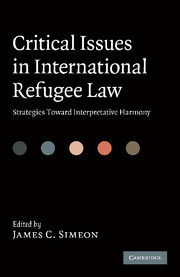Book contents
- Frontmatter
- Contents
- Notes on contributors
- Foreword by Justice Tony North
- Acknowledgements
- Introduction
- Chapter 1 From refugee to judge of refugee law
- Chapter 2 Individual risk, armed conflict and the standard of proof in complementary protection claims:
- Chapter 3 Running scared since 9/11:
- Chapter 4 Asymmetrical sovereignty and the refugee:
- Chapter 5 Economic harm as a basis for refugee status and the application of human rights law to the interpretation of economic persecution
- Chapter 6 The fragmented nature of the international refugee regime and its consequences:
- Index
- References
Chapter 5 - Economic harm as a basis for refugee status and the application of human rights law to the interpretation of economic persecution
Published online by Cambridge University Press: 17 February 2011
- Frontmatter
- Contents
- Notes on contributors
- Foreword by Justice Tony North
- Acknowledgements
- Introduction
- Chapter 1 From refugee to judge of refugee law
- Chapter 2 Individual risk, armed conflict and the standard of proof in complementary protection claims:
- Chapter 3 Running scared since 9/11:
- Chapter 4 Asymmetrical sovereignty and the refugee:
- Chapter 5 Economic harm as a basis for refugee status and the application of human rights law to the interpretation of economic persecution
- Chapter 6 The fragmented nature of the international refugee regime and its consequences:
- Index
- References
Summary
Introduction
The 1951 Refugee Convention is so strongly linked in people's minds to the protection of civil and political rights that refugee status is often referred to as “political asylum.” Yet claims to refugee status based on economic forms of persecution and on persecution for reasons of economic status have long been recognized as falling within the Convention definition. Although refugee judges routinely assess such claims, consensus remains elusive on the extent to which the Convention properly encompasses violations of economic, social or cultural rights. Commentators note troubling inconsistencies in approach to economic claims within and between jurisdictions, as well as the de jure or de facto imposition of more restrictive standards for harm, risk, ground and/or nexus than are employed for claims based on violations of civil and political rights.
Some argue that there is further capacity for recognition of economic claims to refugee status. This case has been put most comprehensively by Michelle Foster, who contends that refugee law has so far largely failed to reflect the growth of a more sophisticated and complex understanding within the human rights realm of the content of economic, social and cultural rights. She argues that the growing maturity of this aspect of human rights law provides a principled basis for refugee judges to re-assess the Convention's scope.
However, there are diverging views as to whether the Convention can and should include a wider range of economic claims.
- Type
- Chapter
- Information
- Critical Issues in International Refugee LawStrategies toward Interpretative Harmony, pp. 143 - 173Publisher: Cambridge University PressPrint publication year: 2010
References
- 2
- Cited by

